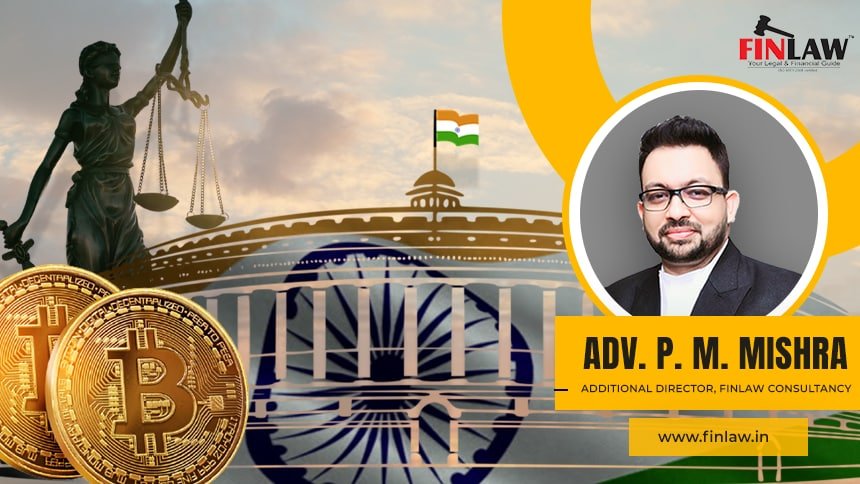
A well-known Indian law firm, Finlaw Associates, and the Estonian Crypto Association recently announced their intention to provide representation to the Indian government regarding cryptocurrency regulations in the country. The representation will be presented to the Indian Finance and Legal Department by the last week of February 2021.
Currently, the lack of clear regulations for the cryptocurrency and blockchain sectors has created a lot of uncertainty for the community. So far, the government has taken an ambiguous stance on cryptocurrencies and the blockchain sector, publicly claiming to adopt blockchain technology for governance while avoiding the cryptocurrencies that make the distributed ledger work in the first place.
According to Adv. PM Mishra, the managing partner of Finlaw Associates, the proposed regulatory representation will include a paper that will more or less refer to regulations related to the existing FEMA Act, SEBI Guidelines for Securities, GUS (Collective Investment Scheme) , RBI, Income Tax and GST.
In his words, Mr. Mishra answers some questions that prevail in the country’s cryptocurrency community.
Q: Why did Finlaw Associates think of making such a proposal? What is its need?
Adv. Mishra: We all know the phrase “ignorance is bliss” that may apply to some, but ask anyone in business or finance and they will make it clear that “ignorance is risk.” Every market has adequate regulations in place to ensure transparency and fairness. When it comes to the emerging fourth asset class – cryptocurrencies – there is no single regulator in India. Such a situation created an atmosphere of uncertainty and confusion.
In the absence of clear regulations on cryptocurrencies and blockchain technology, businesses in this sector have been hit, innovation hindered, and the resulting lack of accountability has helped cryptocurrency-related fraud and Ponzi schemes flourish.
If India needs to emerge as a wise leader, promoting innovation, entrepreneurship, and getting the maximum benefit from crypto and blockchain technology, it needs to lead the industry with a balanced legal framework.
Q: How is India losing due to lack of crypto regulations? What impact does this have on innovation?
A: Without clear regulations, cryptocurrency innovation will be stifled in India. Entrepreneurs stand on the sidelines for fear of innocently breaking the law, while investors are left behind due to uncertainty about valuations. In the meantime, India will suffer as other countries lure innovators away by setting rules that make their jurisdiction more favorable to cryptocurrencies. The government also risks having fraudulent cryptocurrency suppliers distribute the good.
Aside from intellectual brain drain and fraudulent activity, clear crypto rules are also encouraging more people to adopt cryptocurrencies, which increases the volume of transactions. This in turn creates the potential to generate additional revenue in the form of direct and indirect taxes without burdening the community.
Q: What’s new in your proposal? How is it different from other suggested things in different countries?
A: In contrast to the draft crypto rules previously worked out, we call on the government to ensure that everyone involved is adequately involved. In our proposal, we encourage the creation of a self-regulatory agency to promote and enforce standards in the cryptocurrency community. At the same time, an interacting working group with representatives of the crypto community must be convened to harmonize existing regulatory practices and develop a formal policy for cryptocurrencies.
We believe it is important to keep the public informed about crypto rules, especially since the whole requirement for creating cryptocurrencies is the decentralization and democratization of finances. By posting a public notice of the proposed rule for cryptocurrencies, the government should receive comments from the public and, if necessary, make the necessary changes based on the feedback received.
The government should also officially recognize the importance of decentralization and use it as a basis for determining whether or not a cryptocurrency is a security. Usually, a cryptocurrency with the highest degree of decentralization is not considered a security.
These steps will help promote order, consistency, and accountability in the crypto market without placing undue burdens on it. It will also help India as a country establish itself as a wise leader in regulating cryptocurrency, which will fuel entrepreneurship and innovation in that country. After all, wisdom – more than ignorance – is a truer form of bliss.
Similarly, changes to Income Tax and GST laws would clarify the applicability of taxes, and finally India’s Criminal Code (IPC) along with IT laws would recognize certain acts as criminal offenses in order to impose penalties.
Q: Do you think cryptocurrencies will be the money of the future?
A: Cryptocurrencies are increasingly recognized as a medium for exchanging value in many countries, and some governments even allow their citizens to pay bills and taxes with them. It is only a matter of time before Bitcoin and other cryptos are widely accepted.
The advent of neobanks is gradually moving the entire banking business online. It also offers a great deal of flexibility and a strong use case for using cryptocurrency in banking – an opening for digital assets to get into mainstream financing.
The resilience of cryptocurrencies can be seen in how BTC has recovered from the global COVID situation. At the same time, other countries, including China, are showing more than expected interest in crypto as they work to shape the future alternative economy. The ongoing race is more of a reason for India to jump in and not be left behind.
In the end, we want to convey that our country urgently needs fintech regulation regarding crypto, AI, blockchain and more to stop Ponzi system operators, cybercrime and financial terrorism altogether.
Mr. Mishra can be reached at [email protected] or + 91-9820907711
